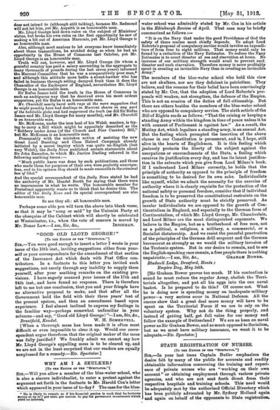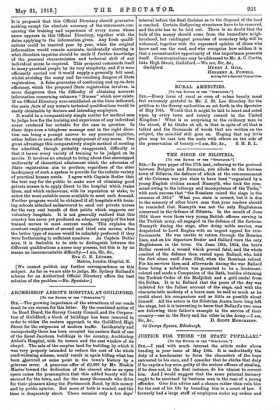STATE REGISTRATION OF NURSES.
ITO THE EDITOR OF THE "SPECTATOR."] Sin, —In your last issue Captain Butler emphasizes the desire felt by many of the public for accurate and readily obtainable information concerning the training and experi- ence of private nurses who are "working on their own account " or obtaining employment through various private agencies, and who are not sent forth direct from their respective hospitals and training schools. This need would. be adequately met by the authorized Official Directory which has been publicly advocated by Mr. Sydney Holland again and again on behalf of the opponents to State registration,
It is proposed that this Official Directory should guarantee nothing except the absolute accuracy of the statements con- cerning the training and experience of every nurse whose name appears in this Official Directory, together with the dates applying to the information given. Any fresh qualifi- cations could be inserted year by year, while the original information would remain accurate, incidentally showing in what direction inquiries should be made if further knowledge of the personal characteristics and technical skill of any individual nurse be required. This proposal commends itself to many practical people by its very simplicity, and if it were efficiently carried out it would supply a generally felt need, whilst avoiding the many and far-reaching dangers of State registration. A false guarantee of continuing and up-to-date efficiency, which the proposed State registration involves, is more dangerous than the difficulty of obtaining accurate information concerning unknown "Nurses" which now exists.
If an Official Directory were established on the lines indicated, the main facts of any nurse's technical qualifications would be easily obtainable by doctors and intending employers.
It would be a comparatively simple matter for medical men to judge how far the training and experience of any individual nurse rendered her suitable for the case in question. In these days even a telephone message sent in the right direc- tion can bring a prompt answer to any personal inquiries, either before or soon after the employment of any nurse. One great advantage this comparatively simple method of meeting the admitted, though probably exaggerated, difficulty is that it leaves every variety of training to be judged on its merits. It involves no attempt to bring about that stereotyped uniformity of theoretical attainment which the advocates of State registration aim to produce, regardless of the utter inadequacy of such a system to provide for the infinite variety of practical human needs. I agree with Captain Butler that the best way for the public to make sure of obtaining good private nurses is to apply direct to the hospital which trains them, and which endeavours, with its reputation at stake, to select the most suitable nurse available to meet each demand. Further progress would be obtained if all hospitals with train- ing schools attached endeavoured to send out private nurses for the very real benefit of that public which supports our voluntary hospitals. It is not generally realized that this country has never yet produced an adequate supply of the best trained nurses to meet current needs. This explains the constant employment of second and third rate nurses, when the better type of nurses would be infinitely preferred if they were forthcoming in sufficient numbers. As Captain Butler says, it is desirable to be able to distinguish between the different qualifications a nurse may possess, but this is by no means an insurmountable difficulty.—I am, Sir, &e., EVA. C. E. 'ACRES, Matron, London Hospital, E.
[We cannot publish any further correspondence on this subject. As far as we are able to judge, Mr. Sydney Holland's scheme for an Authorized Official Directory offers the best solution of the problem.—En. Spectator.]



















































 Previous page
Previous page